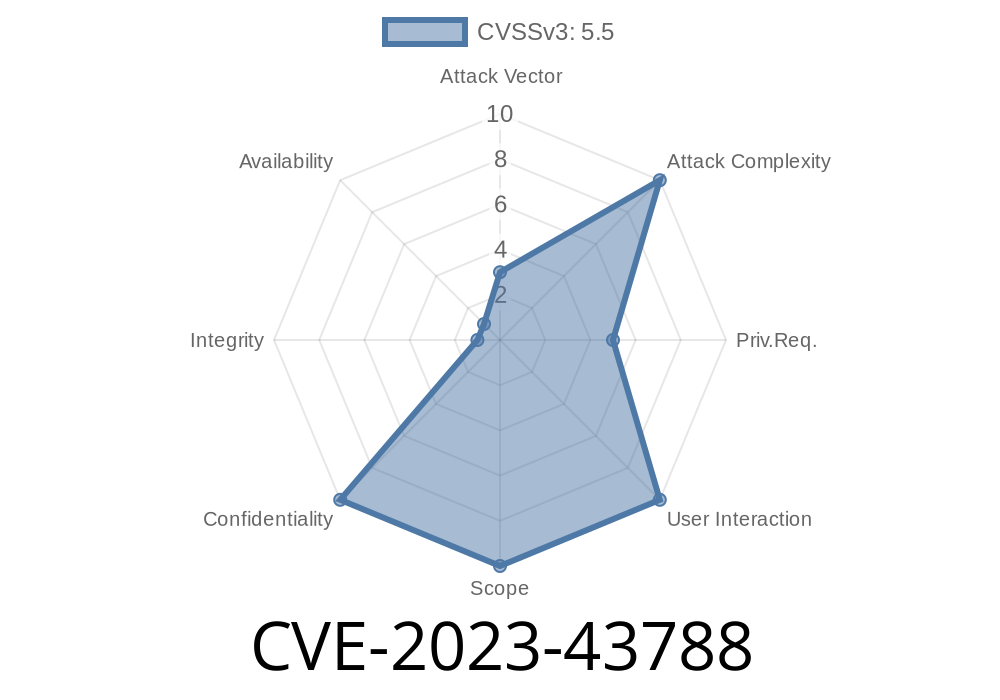CVE-2023-43788 is a security flaw discovered in libXpm, a widely used open-source library for handling XPM (X PixMap) image files in X Window System applications. This vulnerability, discovered in 2023, highlights how even small image-parsing bugs can turn into real-world risks—especially when those libraries are used in server or desktop environments.
In this post, we’ll break down the vulnerability in simple terms, walk through the actual code that caused it, demonstrate a basic proof-of-concept exploit, and offer links to original advisories and more reading.
What is libXpm?
libXpm is a C library used by many Unix-like systems for working with XPM images. XPM is a simple ASCII-based image format used in GUI desktops and tools like X11, GNOME, and KDE.
If a program lets a user (or another program) load an XPM image—by opening a file or reading from a buffer—libXpm's functions process and display it. If the code parsing that image has flaws, an attacker can use a specially crafted image to exploit them.
The Vulnerability: Out-of-Bounds Read in XpmCreateXpmImageFromBuffer()
CVE-2023-43788 is an out-of-bounds read error in the function XpmCreateXpmImageFromBuffer(). If you feed this function a malicious buffer, it reads more bytes from memory than it should, leaking sensitive contents.
This can allow a local attacker to find secrets, passwords, or other private information in memory—if they can get libXpm to open a crafted image.
Boundary condition bugs like this happen when the code fails to check if the data it's reading stays inside the allocated area. In this case, libXpm didn’t properly check buffer limits.
The Flawed Code
Here’s a simplified code snippet showing the risky part (based on this patch):
// vulnerable code (simplified example)
int XpmCreateXpmImageFromBuffer(
char *buffer, XpmImage *image, XpmInfo *info)
{
...
while (*buffer) {
char c = *buffer++;
// Do something with c
// Potentially reading past buffer if not properly bounded
}
...
}
The function assumes the buffer contains a properly NULL-terminated string, so it keeps reading until it hits a (\). If an attacker passes a buffer that is not properly terminated, the function continues reading into adjacent memory—which might contain secrets.
The fix adds stricter validation to prevent this overread.
To exploit this bug, an attacker would typically
1. Create a malicious XPM file (or image buffer) that lacks proper termination, or intentionally controls where the buffer ends.
Trigger an application linked with libXpm to open this file or interpret this buffer.
3. Observe leaked memory—the out-of-bounds read may spill sensitive data, which the attacker can view if (for example) the output of the parsing is shown in error messages or returned over a network.
Example: Reading Extra Memory with Malformed Buffer
Here’s a super simple demonstration (for educational purposes only!). Assume you have the vulnerable code above and compile it with:
#include <stdio.h>
#include <string.h>
void vulnerable(char *buffer) {
while (*buffer) {
putchar(*buffer++);
}
printf("\n");
}
int main() {
char test[8] = {'H','e','l','l','o','!','?','X'}; // no null terminator!
vulnerable(test);
// may print extra memory content after 'X'
return ;
}
Instead of stopping at the intended end, this may keep printing bytes from memory after 'X' until a accidental \ (null byte) is found.
Real-World Impact
CVE-2023-43788 is not directly a remote code execution bug, but if confidential memory is exposed (credentials, private keys, etc.), it can lead to further compromise.
Important: If any process running as a privileged user (e.g., root or a critical service) parses untrusted XPM files (for instance, via a file upload feature or desktop background setting dialog), this could leak security-critical data.
How to Fix
Upgrade libXpm!
Make sure you are running libXpm 3.5.17 or later, which includes the fix.
Linux distributions have rolled out patched packages.
- If you are maintaining a desktop or server that parses images from untrusted sources, update right away.
References
- Freedesktop.org Gitlab Issue #16
- libXpm 3.5.17 Release Notes
- NVD Entry for CVE-2023-43788
- Debian Security Advisory DSA-5508-1
- oss-security mailing list post
Conclusion
CVE-2023-43788 is a reminder that image-processing libraries—often thought of as non-threatening—can expose sensitive information via memory bugs. Out-of-bounds reads are subtle but dangerous: they usually don’t let attackers execute code, but they can reveal secrets, especially if sensitive apps process images from users.
The fix is out—just update! If you develop or manage systems that use X11, GNOME, or similar tech, take inventory and make sure your dependencies are patched.
If you found this post helpful or have more questions, feel free to get in touch!
Timeline
Published on: 10/10/2023 13:15:22 UTC
Last modified on: 11/09/2023 09:15:08 UTC
